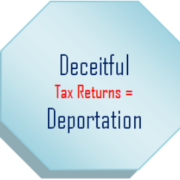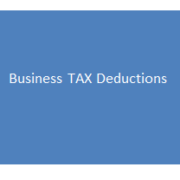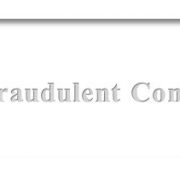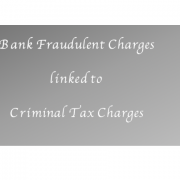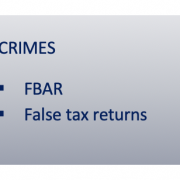IRS warns against using Ghost Tax preparers
Large Tax Refunds: Are they too good to be true?
The IRS has long cautioned taxpayers against using disreputable tax return preparers. In a recent announcement, the IRS warned taxpayers against using “Ghost Preparers” to prepare their tax returns. A Ghost Preparer is a variation of a disreputable tax preparer. These preparers target mostly immigrants who have just arrived in the U.S. and low to moderate wage earners, who often rely upon a referral from a friend or relative who previously received a large tax refund. Unbeknownst to the taxpayers, they are unwittingly committing tax fraud. Taxpayers who are unfamiliar with the U.S. system of taxation may not understand that they are responsible for the content of their tax returns, which they sign under penalty of perjury. Consequently, any false statement contained in a tax return is the ultimate responsibility of the taxpayer and can lead to unintended results including the assessment of additional tax, interest and penalties, as well as a referral to Criminal Investigation of the Internal Revenue Service.
The following discussion reinforces the point that you should stay clear of those who promise unusually large tax refunds and only hire a licensed Attorney, CPA or Enrolled Agent.
Ways Ghost tax return preparers defraud the IRS
Return preparer fraud and inflated refund claims are two of the IRS “Dirty Dozen” tax scams and have been the focus of the Internal Revenue Service for the past several decades. While technological advancements and the use of analytics have enabled the IRS to identify patterns of fraud associated with the fraudulent preparation of federal income tax returns, fraudulent return preparers continue to prey upon innocent taxpayers.
A disreputable tax preparer is a tax return preparer that promises and typically generates large tax refunds on behalf of its clients by fraudulently preparing income tax returns. The scheme involves making up deductions such as employee business expenses, investment advisory expenses, and other miscellaneous Schedule-A deductions.
They also fabricate medical expenses, charitable contributions and other itemized deductions. In certain cases, an unscrupulous return preparer will claim fictitious dependents to take advantage of or increase the refundable portion of the Child Tax Credit. In other instances, these fraudsters will create a fake taxpayer business and include made up income and expenses on Schedule C in order to maximize the Earned Income Credit. In extreme cases, these return preparers will create fictitious W-2’s utilizing phony federal taxes withheld in order to increase the tax refund.
Often times, the fraudulent return preparer will have the client’s tax refund deposited into an account over which the return preparer has control over. The return preparer will then retain a percentage of the refund or a pre-agreed upon flat fee and thereafter remit the balance to the client. In other cases the fraudulent return preparer will give the client a refund based upon the correct tax liability and pocket the difference generated by refund from the fraudulent return.
The traditional fraudulent return business will generally operate in the form of a corporation or limited liability company with a nominee named as the principal in order to mask the identity of the true owner. More often than not the True Owner is on the IRS radar for past transgressions and may be the subject of an injunction or prior criminal prosecution.
In many respects, the business may appear to be legitimate and will include a store front, phone number and website. As part of the scheme, the business will also have a Federal Employer Identification Number, Preparer Tax Identification Number (PTIN) as well as an Electronic Return Originator Number. Unfortunately, these identification numbers are in the name of someone other than the true principal and, in some cases, have been stolen.
In response to the recent criminal prosecutions of and civil injunctions issued against unethical return preparers, the Ghost Preparer has emerged as the business model of choice for fraudsters. The Ghost Preparer is similar in many respects to the traditional fraudulent return preparer. The Ghost Preparer makes up deductions, claim credits and create fictitious income in order to maximize the client’s tax refund. However, the Ghost Preparer differs in several respects.
The Law
Under the law, anyone who receives compensation for preparing a tax return, must have a valid (PTIN) and must sign the return. Unlike his unscrupulous colleagues, a Ghost Preparer does not sign the tax return and omits any information which could provide the IRS with an audit trail. He will generally instruct the client to sign and mail the return to the IRS. In cases where the return is submitted electronically, the Ghost Preparer will submit the return as “self-prepared.”
The Ghost Preparer insists on cash payment for his services. In other cases, he may have the client authorize the IRS directly deposit the client’s tax refund into an account the Ghost Preparer has control over. Once the refund is received, the Ghost Preparer deducts his fee and remits the balance to the client.
Initially, clients are delighted with the huge refund they are receiving and are quick to the relay their good fortune to their friends and relatives. In turn, friends and relatives flock to the Ghost Preparer in hopes of also receiving a large tax refund. The process is generally repeated for a period of three or four years before the IRS identifies the irregularities and contacts the taxpayer.
What happens next?
Long after the tax refunds have been spent on a home theater system, vacation and down payment on a new automobile, the taxpayer receives a Notice of Adjustment from the IRS advising him that he now owes $48,745.68 in additional tax, penalties and interest for a three year period. After the taxpayer picks himself off the floor, he contacts the Ghost Preparer only to find that the Ghost Preparer has moved on to greener pastures. Further inquiry reveals that the Ghost Preparer used a fictitious name. Since the tax return was deemed “self-prepared” the taxpayer is left holding the bag.
The taxpayer’s problems are often exacerbated where multiple years are involved and the total additional tax, penalties and interest exceeds $50,000. A permanent lawful resident of the United States who has recently filed for Naturalization may suddenly find their application denied or subject to an indefinite delay in processing. In addition, a taxpayer may find his or her passport has been revoked or the subject of a Notice of Federal Tax Lien. In extreme cases, a taxpayer may also become the subject of an IRS criminal investigation and subject to deportation.
The fraudulent tax return industry has been able to flourish, in part, due to lack of oversight. Practice before the Internal Revenue Service is limited to Attorneys, Certified Public Accountants and Enrolled Agents who are governed by Circular 230. Unfortunately, tax return preparation is not limited to those who are subject to Circular 230. Consequently, anyone can prepare income tax returns including those intended on defrauding the IRS without having to adhere to the professional guidelines.
Financial and emotional cost related to being scammed by a Ghost Preparer, can be devastating and life changing. If you have been receiving unusually large refunds, it may be advisable to have a professional take a second look to determine if you are the victim of a fraudulent return preparer. There are steps that can be taken to mitigate the impact of filing such returns.
The takeaway here is that you should only hire an Attorney, CPA or enrolled agent to prepare your federal tax return. In most cases, the preparation fees are no more than the fees charged by those not subject to Circular 230.



